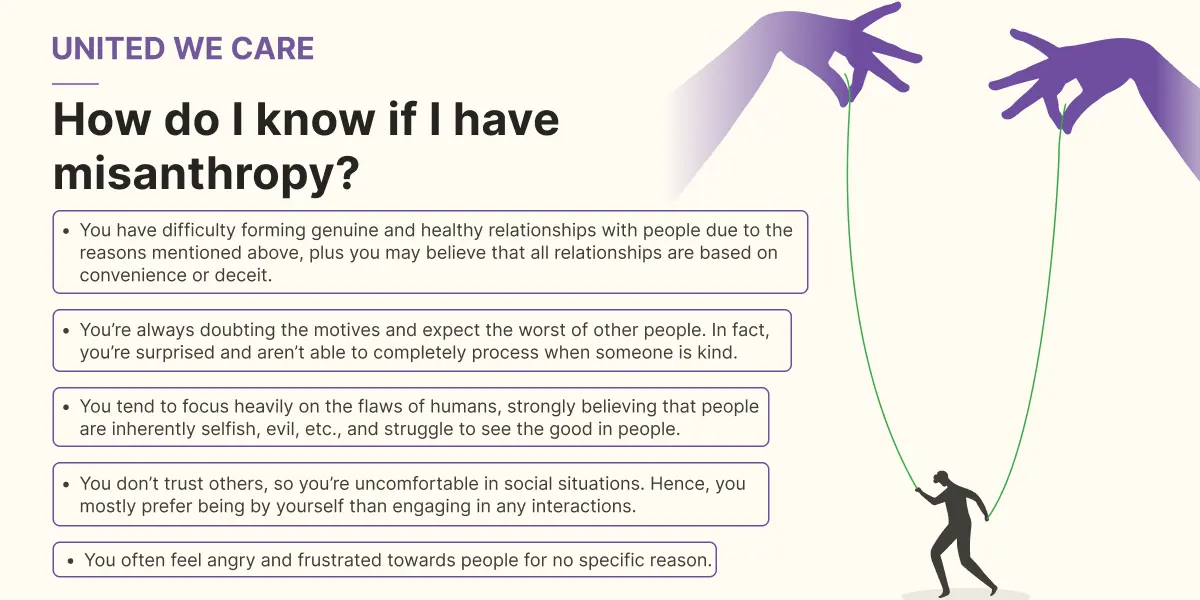Introduction
We have more reasons than ever before to be really upset with humankind and the kind of society we’ve become. We’re damaging the environment; our political systems are corrupt; there are economic inequalities, social injustice, war and genocide, violation of basic human rights, and artificial intelligence may be on its way to making humans obsolete. These are perfectly normal reasons that can make you disturbed and upset with humankind.[1] Now, you either take these feelings and use them to examine, contemplate, and critique the flawed nature of humans and our societal constructs. Or, you harbor a deep dislike and contempt for all of humanity, regardless of these issues. While you can call both these attitudes misanthropy, the former refers to it from a philosophical standpoint, whereas the latter views it from a psychological standpoint. In this article, we’ll discuss what misanthropy means in different contexts, dig deeper into the causes and symptoms of psychological misanthropy, and evaluate whether you need to make changes in your attitude related to humankind.
What does misanthrope mean?
In Greek, “misos” means hatred, and “anthropos” means human. Hence, a misanthrope is a person who generally strongly dislikes humankind. However, there can be a difference between the expression of this dislike.
Misanthropy: Philosophical vs. Psychological Context
When we talk about a misanthrope from a philosophical perspective, we’re talking about a person who may be skeptical or even disapprove of our morals and ethics because of how they’ve experienced the flawed nature of humans. More than hating humankind, this person is involved in critiquing our nature as humans and the constructs of society with the intention of finding more authentic ways of living. The views expressed may not be the personal feelings of the philosopher and are meant to be used to explore broader themes. Philosophers such as Diogenes and Schopenhauer worked towards shedding light on human nature instead of simply hating on the flaws.
In a psychological context, a misanthrope is a person who persistently hates and distrusts everyone in general. This strong negative view may also be accompanied by intense emotional responses such as being angry and full of contempt. In this case, we view a misanthrope from the lens of what factors may be contributing to this attitude and the individual’s mental well-being and relationships.
Is misanthropy a mental illness?
The Diagnostic and Statistical Manual of Mental Disorders (DSM) does not classify misanthropy as a mental illness. This is because, as a standalone condition, it does not significantly negatively impact our functioning in any area.
However, misanthropy is associated with certain mental health conditions such as depression, anxiety, and personality disorders.[2] If you suffer from any of these, you may be more likely to display misanthropic tendencies.
By understanding the potential causes of misanthropy, we may be able to address the associated mental health conditions better.
Causes of misanthropy
One of the most common causes of misanthropy is experiencing abuse or betrayal from someone. When this experience is traumatic, it may turn into a general dislike and distrust of people as an emotional response to protect yourself. Similarly, if you’ve experienced childhood trauma in any form, it can negatively impact your view of humankind as a whole.
On top of this, our brains can sometimes make errors in judgment owing to cognitive biases. Giving more weightage to negative experiences and information and searching for and favoring our own negative beliefs and assumptions are some cognitive biases that can lead to more misanthropic tendencies.
How do I know if I have misanthropy?
To understand whether you are a misanthrope, you need to become aware of your beliefs, perspectives, and reactions to other people. You can look for signs and symptoms such as:

- You’re always doubting the motives and expect the worst of other people. In fact, you’re surprised and aren’t able to completely process when someone is kind.
- You don’t trust others, so you’re uncomfortable in social situations. Hence, you mostly prefer being by yourself than engaging in any interactions.
- You often feel angry and frustrated towards people for no specific reason.
- You have difficulty forming genuine and healthy relationships with people due to the reasons mentioned above, plus you may believe that all relationships are based on convenience or deceit.
- You tend to focus heavily on the flaws of humans, strongly believing that people are inherently selfish, evil, etc., and struggle to see the good in people.
How do I stop misanthropy?
Being a misanthrope can negatively impact your well-being and relationships. You may be socially isolating yourself to avoid dealing with people, which can make you feel even more anxious and depressed. Having this attitude can also reduce your quality of life as it can lead to emotional exhaustion. Hence, it is important to transform your attitude towards something more positive.
You can begin by reflecting on why you have these misanthropic views. Think about the experiences that have shaped you, and be honest with yourself if you find yourself functioning from a place of assumptions. Pay close attention to whether a cognitive bias is at play.
Once you have an awareness of your thoughts, beliefs, assumptions, and errors in judgment, you can practice cognitive restructuring. This involves taking the thought patterns that are negative and not serving you in any way and questioning their validity, i.e., in this case, a dislike and distrust towards humankind. Once you establish that these thought patterns are not true or accurate, you can actively look for experiences or examples that highlight the better parts of human nature, such as compassion or kindness. [3]
If you’ve been keeping yourself from social interactions, you can consider reinvolving yourself in them, as having even a handful of meaningful relationships can help you change your views of humankind. You can start socializing gradually in environments that you feel safe and comfortable in.
Conclusion
Being a misanthrope does not mean that you hate people. It means that you have a general dislike towards human nature and its flaws. Depending on how you express this dislike, it can affect your well-being and relationships. If you are a philosophical misanthrope, you use your observations to create awareness and better societal structures. If you’re a psychological misanthrope, your dislike towards humankind is personal and regardless of societal context. You may be isolating yourself to avoid interactions and have intense reactions to situations that involve engaging with other people. In this case, your well-being and relationships are affected negatively. You can practice becoming more self-aware and restructure your thought patterns that do not serve you to something more positive. A mental health therapist can help you with effective strategies to cope and improve your well-being. Book a session with one of our mental health experts to cope with your attitude regarding humankind. At United We Care, we offer the most appropriate, clinically backed solutions for all your well-being needs.
References:
[1] Lisa Gerber, “What is So Bad about Misanthropy?”, Environmental Ethics, Volume 24, Issue 1, Spring 2002, Pages 41-55, https://doi.org/10.5840/enviroethics200224140. Accessed: Nov. 16, 2023
[2] D. Mann, “Misanthropy: A Broken Mirror of Narcissism and Hatred in Narcissistic Personality,” in Psychoanalytic Perspectives, Ed. Celia Harding, 1st ed., 2006, [Online]. Available: https://www.taylorfrancis.com/chapters/edit/10.4324/9780203624609-10/misanthropy-broken-mirror-narcissism-hatred-narcissistic-personality-1-david-mann. Accessed: Nov. 16, 2023
[3] Schiraldi, G.R., Brown, S.L. Primary Prevention for Mental Health: Results of an Exploratory Cognitive-Behavioral College Course. The Journal of Primary Prevention 22, 55–67 (2001). https://doi.org/10.1023/A:1011040231249. Accessed: Nov. 16, 2023





